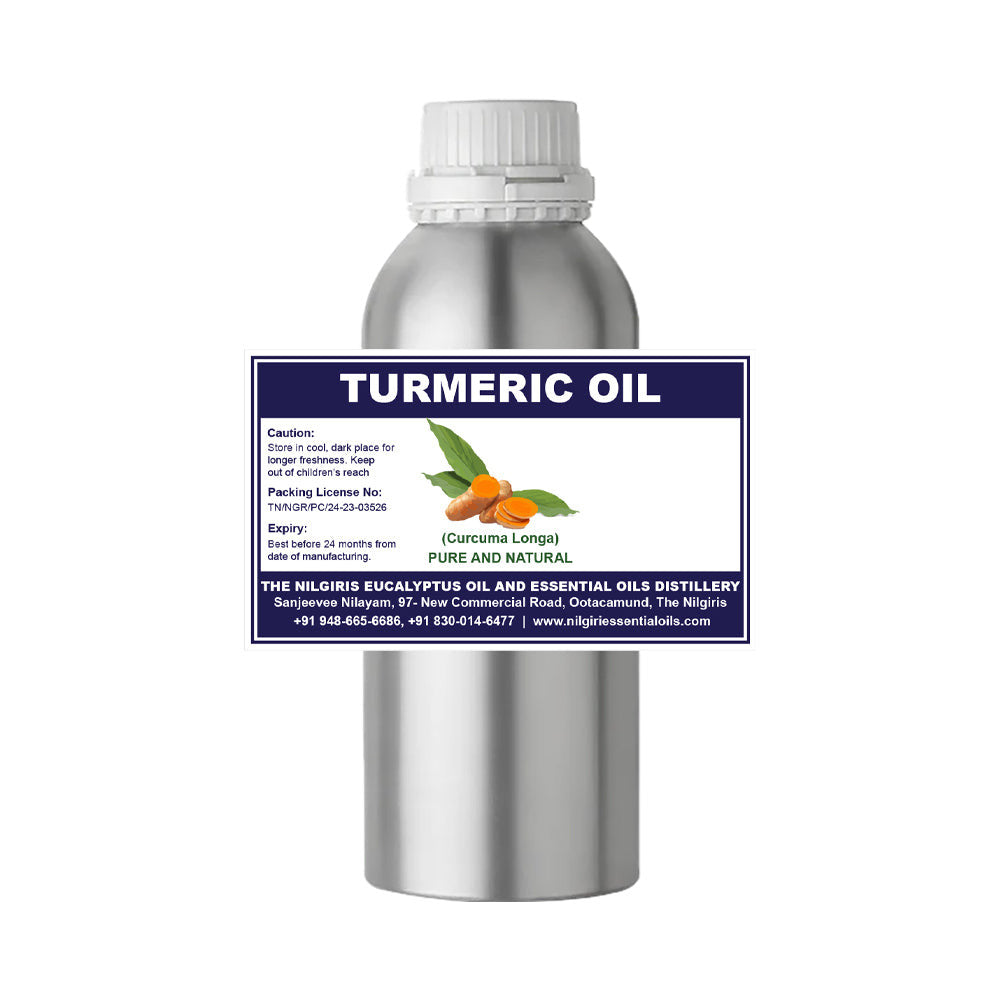Description
Turmeric oil is derived from the roots of the Curcuma longa plant, commonly known as turmeric. It is extracted through steam distillation or solvent extraction of the rhizomes (underground stems) of the turmeric plant, resulting in a potent and aromatic oil. Turmeric oil contains bioactive compounds such as curcumin, turmerone, and ar-turmerone, which contribute to its distinctive golden color and therapeutic properties. It has a warm, earthy, and spicy aroma with hints of ginger and citrus.
Benefits:
-
Anti-inflammatory Properties: Turmeric oil is renowned for its potent anti-inflammatory properties, primarily attributed to its active compound, curcumin. It can help reduce inflammation in the body, alleviate pain, and support joint health. Topical application of turmeric oil may also help relieve symptoms of inflammatory skin conditions such as eczema, psoriasis, and acne.
-
Antioxidant Protection: Turmeric oil is rich in antioxidants that help neutralize free radicals and protect cells from oxidative damage. Regular use of turmeric oil may help slow down the aging process, prevent premature aging, and promote overall skin health. It can also help protect against chronic diseases such as cancer, heart disease, and neurodegenerative disorders.
-
Skin Care: Turmeric oil has antimicrobial and antiseptic properties that make it beneficial for skin health. It can help cleanse and purify the skin, reduce acne and blemishes, and soothe irritation and redness. Turmeric oil is often used in skincare products such as cleansers, serums, and masks to promote clear, radiant, and youthful-looking skin.
-
Digestive Aid: Turmeric oil can aid digestion and relieve gastrointestinal discomfort. It helps stimulate the production of digestive enzymes and bile, facilitating the digestion and absorption of nutrients. Turmeric oil may also help alleviate symptoms of indigestion, bloating, gas, and stomach cramps.
-
Aromatherapy: The warm and spicy aroma of turmeric oil has grounding and uplifting effects on the mind and body. In aromatherapy, it is used to promote relaxation, reduce stress and anxiety, and enhance mood and emotional well-being. Diffuse turmeric oil in a diffuser or aroma lamp to create a calming and invigorating atmosphere in your home or workspace.
How to Use:
-
Topical Application: Dilute turmeric oil with a carrier oil such as coconut oil, olive oil, or sweet almond oil before applying it to the skin. Apply a small amount of diluted turmeric oil to the affected area using a cotton swab or clean fingertips. Turmeric oil can be used to relieve joint pain, muscle soreness, and inflammatory skin conditions.
-
Aromatherapy: Add a few drops of turmeric oil to a diffuser or aroma lamp and diffuse it in the air to create a warm and inviting atmosphere. Inhale deeply to experience its grounding and uplifting effects on the mind and body. Turmeric oil blends well with citrus oils, spicy oils, and woody oils.
-
Massage Oil: Mix turmeric oil with a carrier oil and use it for a soothing and therapeutic massage. Massage the oil onto the skin in gentle, circular motions to relax the muscles, reduce tension, and promote overall well-being. Turmeric oil can also be added to bath water for a relaxing and aromatic bath experience.
-
DIY Skincare: Incorporate turmeric oil into your skincare routine by adding a few drops to your favorite skincare products or DIY formulations. Turmeric oil can be used in face masks, serums, creams, and lotions to promote clear, radiant, and youthful-looking skin. Note: Turmeric oil may stain clothing and surfaces, so use with caution.
Always perform a patch test before using any essential oils or carrier oils on your skin to check for any allergic reactions. Additionally, pregnant or nursing women and those with certain medical conditions should consult a healthcare professional before using essential oils and carrier oils.
Bottle Size & Packing

30 ml
Glass

30 ml
Aluminium

150 ml to 1 Litre
Aluminium

5 Litres / Kgs
HDPE Can

35 Litres / Kgs
HDPE Can

200 Litres / 180 Kgs
GI Barrel


